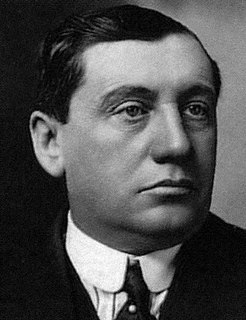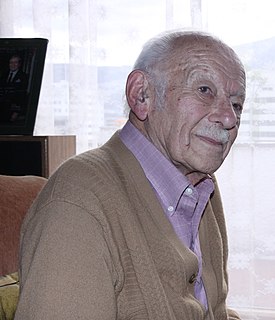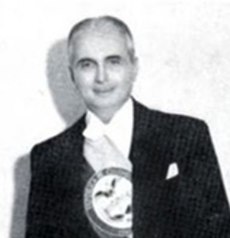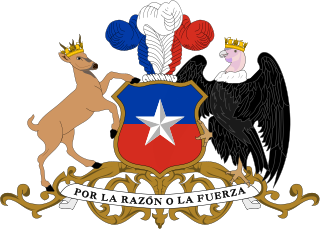The United People's Movement was a political party in Saint Vincent and the Grenadines. It first contested national elections in 1979, when it received 13.6% of the vote, but failed to win a seat. Shortly before the 1984 elections several members left to form the Movement for National Unity after a majority of UPM members refused to renounce the policies of Fidel Castro. As a result, the party's vote share fell to 3.2% and it remained seatless. In 1989 it received just 468 votes and again failed to win a seat. It did not contest any further elections.

General elections were held in Chile on 30 October 1932. Arturo Alessandri of the Liberal Party was elected president, whilst the Conservative Party and Radical Party emerged as the largest parties in the Chamber of Deputies.

Presidential elections were held in Chile on 22 October 1925. They were the first direct elections in the country's history and the first to be held under the new 1925 constitution. The result was a victory for Emiliano Figueroa, who received 71% of the vote.

Federal elections were held in Germany on 12 January 1912. Although the Social Democratic Party (SPD) had received the most votes in every election since 1890, they had never won the most seats, and in the 1907 elections they had won fewer than half the seats of the Centre Party despite receiving over a million more votes. However, this election saw the party win more than double the number of votes of the second-placed Centre Party and become the largest party, winning 110 of the 397 seats.

Parliamentary elections were held in Hungary on 10 May 1998, with a second round of voting in 175 of the 176 single member constituencies on 24 May.

Parliamentary elections were held in Norway in 1888. Although the Liberal Party received the most votes, the result was a victory for the Conservative Party, which won 51 of the 114 seats in the Storting. The Conservatives formed a government led by Emil Stang.

General elections were held in Ecuador on 17 May 1992, with a second round of the presidential elections on 5 July. The presidential elections resulted in a victory for Sixto Durán Ballén of the Republican Union Party–Conservative Party alliance, who received 57.3% of the vote in the run-off. The Social Christian Party emerged as the largest party in the House of Representatives, winning 21 of the 77 seats.
The Movement for National Unity was a political party in Saint Vincent and the Grenadines. It was formed shortly before the 1984 general elections by a split from the United People's Movement due to the refusal of most party members to disown Fidel Castro's politics. Some of the support for the Movement for National Unity was the result of absorbing former members of the disbanded Youlou United Liberation Movement of the 1970s. The new party received 2.0% of the vote, but failed to win a seat. In the 1989 elections it increased its share of the vote to 2.4%, but remained seatless. However, in the 1994 elections it received 17.4% of the vote and won a single seat. In the same year it merged with the Saint Vincent Labour Party to form the Unity Labour Party.

Presidential elections were held in Colombia on 10 February 1914. They were the first direct presidential elections since 1860. The result was a victory for José Vicente Concha of the Conservative Party, who received 89.1% of the vote. Vicente took office on 7 August.

Presidential elections were held in Colombia in February 1922. The result was a victory for Pedro Nel Ospina of the Conservative Party, who received 62% of the vote. He took office on 7 August.

Presidential elections were held in Colombia on 14 February 1926. The result was a victory for Miguel Abadía Méndez of the Conservative Party, who received 99.9% of the vote. He took office on 7 August.

Presidential elections were held in Colombia on 9 February 1930. The result was a victory for Enrique Olaya Herrera of the Liberal Party, who received 44.9% of the vote. He took office on 7 August.

Presidential elections were held in Colombia on 11 February 1934. The result was a victory for Alfonso López Pumarejo of the Liberal Party, who received 99.6% of the vote. He took office on 7 August.

Presidential elections were held in Colombia on 1 May 1938. Eduardo Santos of the Liberal Party was the only candidate after the Conservative Party decided not to contest the elections, and received 100% of the vote. Voter turnout was only 30.2%. Santos took office on 7 August.

Presidential elections were held in Colombia on 3 May 1942. The result was a victory for Alfonso López Pumarejo of the Liberal Party, who received 58.6% of the vote. He took office on 7 August.

Presidential elections were held in Colombia on 5 May 1946, pitching the Colombian Conservative Party against two different Colombian Liberal Party candidates. The Liberals received more votes combined, but due to their division the result was a victory for Mariano Ospina Pérez of the Conservative Party, who received 41.4% of the vote. One of the Liberal candidates, Gabriel Turbay, was also supported by the Social Democratic Party.

Presidential elections were held in Colombia on 4 May 1958. They were the first presidential elections since 1949, following a military coup against President Laureano Gómez in 1953. Following the coup, the two main parties came to an agreement on holding office for alternating periods of four years. The agreement, known as the National Front, was approved in a 1957 referendum.

General elections were held in Colombia on 19 April 1970 to elect the President, the Senate and the Chamber of Representatives. It was the first time all three institutions had been elected on the same day, and was also the last election under the National Front agreement, which had restricted electoral participation to the Conservative Party and the Liberal Party, with each party allocated 50% of the seats in both houses, whilst the Presidency alternated between the two parties. As a result, the main contest in parliamentary elections was between factions within each party, whilst only Conservative candidates ran for the presidency. The result was a victory for Misael Pastrana Borrero, who received 40.7% of the vote. However, supporters of Gustavo Rojas Pinilla claimed that the election had been rigged in favour of Pastrana. Rojas had also been supported by the Christian Social Democratic Party. The 19th of April Movement guerrillas traced their origins to this alleged fraud.

Parliamentary elections were held in Chile on 4 March 1945. Although the Conservative Party received the most votes, the Radical Party remained the largest party in the Chamber of Deputies and the Senate.

Parliamentary elections were held in Chile on 6 March 1949. Although the Social Christian Conservative Party received the most votes in the Senate elections, the Liberal Party won the most seats, whilst the Radical Party remained the largest party in the Chamber of Deputies.














